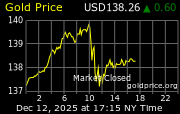Gold price and broader markets stabilized following a mixed November non-farm payrolls report
 On Friday, the gold price and broader markets stabilized following a mixed November non-farm payrolls report. At 120,000, the jobs data came in modestly below the 125,000 consensus estimate among economists. However, the unemployment rate fell to a two-and-a-half year low of 8.6% and the prior two months of data were revised higher.
On Friday, the gold price and broader markets stabilized following a mixed November non-farm payrolls report. At 120,000, the jobs data came in modestly below the 125,000 consensus estimate among economists. However, the unemployment rate fell to a two-and-a-half year low of 8.6% and the prior two months of data were revised higher. Commenting on the jobs report, Miller Tabak market strategist Peter Boockvar stated that “The market focuses on headlines, and if you include the prior two months being revised up, and you think about the three months together, there was more employment than expected.” But “underneath the hood, it’s still sluggish job growth,” he noted. “We’re only averaging 132,000 jobs this year and seeing the biggest drop in the labor force since January, and the participation rate at near record lows.”
As for the gold price, in recent months it has reverted considerably from its primary role as a pure safe haven asset to that of a commodity that provides a hedge against the U.S. dollar. Since reaching an all-time high of $1,921 per ounce on September 6, 2011, the price of gold has largely moved inversely to the greenback and more in line with the euro currency. UBS precious metals analyst Edel Tully wrote in a note to clients that “Our recent meetings suggest clients would prefer for gold to move more convincingly back into the safe-haven camp as its current hybrid state makes it a difficult short-term trade.”
Looking ahead to the coming week, the gold price and broader markets are likely to turn their attention from the recent batch of U.S. economic data to the ongoing sovereign debt crisis in Europe. On Friday German Chancellor Angle Merkel made a speech pushing for tighter restrictions on government spending. She asserted that the 17 nations that use the euro currency must strive to quickly re-establish market confidence by making financial controls stricter.
This week Merkel is scheduled to meet with other European officials at a summit to fortify measures to combat the crisis. Several economists have noted that stricter controls on government spending could pave the way for the European Central Bank (ECB) to provide further aid for governments struggling with their debt loads. Such measures would likely involve additional accommodative monetary policies, a development that could bode well for gold prices.














0 comments:
Post a Comment